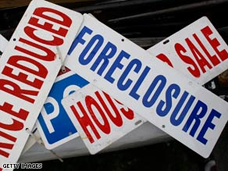 In real estate, a short sale refers to the sale of a property in which the sale price is insufficient to pay off all encumbrances and pay the expenses of sale. If the lender is convinced that the owner, for various reasons, is unable to continue making the payments the lender will often agree to take less than the full amount owed to allow the sale to close escrow. The incentive for the bank to approve a short sale is to have the property sell before the loan becomes a problem account on their books.
In real estate, a short sale refers to the sale of a property in which the sale price is insufficient to pay off all encumbrances and pay the expenses of sale. If the lender is convinced that the owner, for various reasons, is unable to continue making the payments the lender will often agree to take less than the full amount owed to allow the sale to close escrow. The incentive for the bank to approve a short sale is to have the property sell before the loan becomes a problem account on their books.
Before a lender approves a short sale they will make two key decisions.
First, can the owner afford to continue making the payments on the property? If they can there is no reason for the bank to eat the loss. Banks will not look favorably upon a borrower that they determine lied to get the loan.
Second, will approving the short sale leave the bank in relatively the same position as they are likely to be in by going though the foreclosure process and then selling the property? If the bank can do significantly better by foreclosing they are likely to do so.
This Process may be difficult to believe but it is a definite possibility. There are hoops to jump through, banks are willing to allow short sales if the required criteria is met. This is a system that works because the banks do not want to hold property for one but they also do not want to pay a fee (at times up to $25,000) in order to send the property through the foreclosure
process. If you are considering a short sale, there are several requirements and could be some drawbacks as well.